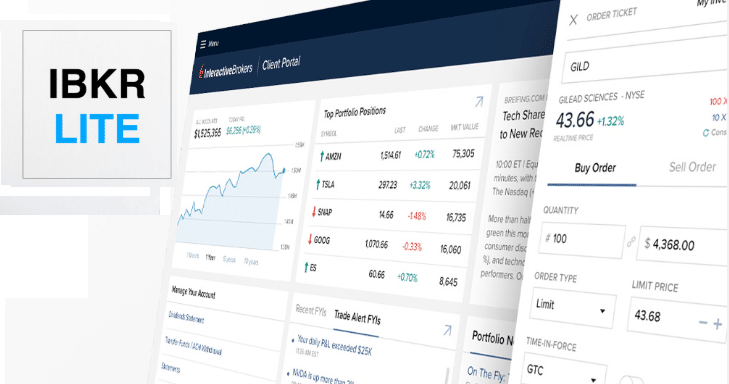Interactive Brokers, one of America’s largest online brokerages dropped something of a bombshell late in September 2019 when it announced that it was to offer ”commission-free trading” from early October 2019 with IBKR Lite.
That announcement came from Interactive Brokers, which is to launch the new service known as IBKR Lite, as of October 2019.
What’s more, it doesn’t appear to be just a short- term promotional offer, but rather a permanent fixture.
That news sent shudders through the share prices of other online brokerage businesses in the US, the shares of TD Ameritrade fell by as much as – 6.50% before recovering some composure.
Interactive Brokers are the latest in a long line of financial service providers to offer free share trading. In fact, we looked at this growing trend for zero-commission stock broking early in July 2019.
However, Interactive Brokers are the first of the major players to make a land grab in this area.
As Dan Moczulski pointed out these commission-free trading arrangements are viable in the USA because certain market makers and hedge funds are able to pay for flow, effectively buying client orders off of aggregators such as stockbroker Robinhood (and shortly Interactive Brokers) but those type of arrangements do not sit well with regulators in the UK, who perceive a series of conflicts of interest when brokers act in this way.
What should clients make of this new free stockbroking service from Interactive Brokers?
Is it unlikely to be the last of its kind?
You might be tempted to think that you should never look a gift horse in the mouth and that the chance to trade for nothing would be too good to miss. But maybe we should just stop to consider a pearl of wisdom from the early days of online marketing, which is that
“When a service is offered to you, for free, then you are the product”
I think there is something in that statement in this context. If the online trading divisions of large hedge funds want to harvest your order flow, they are doing so because they believe they can make money out of it.
Of course, they are not interested in your individual orders per se but in the aggregate flow of orders from the likes of Robin Hood and Interactive Brokers, and they no doubt hope to extract some small fractional value from each trade they capture in the belief that, in aggregate, those profits will exceed the cost of acquiring the order flow.
In compiling this article, I was also struck by a quote from a paper on payment for order flow, published back in 2012, by the then UK regulator, the FSA, which said that
“if the market maker can offer the best price, all other things being equal, then the question arises why it would also be necessary to offer a payment to the introducing broker?”
Food for thought I think you will agree.
If, as clients, we choose to utilise these commission-free dealing arrangements we should do so with our eyes wide open and not be under any misapprehensions, after all, altruism is a rare commodity in the financial markets.
Let’s also be clear that there are going to be caveats and small print to consider.
For example, in the IBKR Lite offering sale trades will attract admin fees equivalent to certain regulatory charges the firm incurs. There are also some restrictions on the types of stocks and securities that can be traded and on the types of accounts that can take advantage of the service.
Competition between CFD brokers, and particularly competition that reduces costs for end-users is usually viewed in a positive light and rightly so. However, there is an old market proverb which says that “there are few winners, if any, in a race to the bottom” I wonder if that’s what we are looking at here?

Richard is the founder of the Good Money Guide (formerly Good Broker Guide), one of the original investment comparison sites established in 2015. With a career spanning two decades as a broker, he brings extensive expertise and knowledge to the financial landscape.
Having worked as a broker at Investors Intelligence and a multi-asset derivatives broker at MF Global (Man Financial), Richard has acquired substantial experience in the industry. His career began as a private client stockbroker at Walker Crips and Phillip Securities (now King and Shaxson), following internships on the NYMEX oil trading floor in New York and London IPE in 2001 and 2000.
Richard’s contributions and expertise have been recognized by respected publications such as The Sunday Times, BusinessInsider, Yahoo Finance, BusinessNews.org.uk, Master Investor, Wealth Briefing, iNews, and The FT, among many others.
Under Richard’s leadership, the Good Money Guide has evolved into a valuable destination for comprehensive information and expert guidance, specialising in trading, investment, and currency exchange. His commitment to delivering high-quality insights has solidified the Good Money Guide’s standing as a well-respected resource for both customers and industry colleagues.
To contact Richard, please see his Invesdaq profile.



